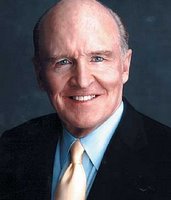 Anyone who has managed sales people for any significant period of time knows it is obvious that different individuals call for different management approaches.
Anyone who has managed sales people for any significant period of time knows it is obvious that different individuals call for different management approaches.Ken Blanchard wrote a book on leadership a number of years ago in his "One Minute Manager" series. I love Ken's books and used his four styles of leadership in managing sales people, other sales managers and even our support staff.
In it's simplest state, situational leadership purports that there are four actual leadership styles. Directing, Coaching, Supporting and Delegating. Blanchard labels each style S1, S2, S3 and S4. I've taken this wide view of leadership and plugged it in to sales management.
S1: Directing. Sales managers typically find themselves working with brand new people, when this is the case, a directive style is best. A directing style defines the roles and tasks of the sales person and supervises them closely. Decisions are made by the sales manager regarding prospecting activity, what accounts are worked and what products are sold. Communication is largely one-way.
S2: Coaching. Sales managers spend A LOT of time coaching. In doing so, they are defining roles and tasks, but also seek ideas and suggestions from their sales people. Decisions remain with the sales manager, but communication is much more two-way.
S3: Supporting. As sales people become sales professionals, managers pass day-to-day decisions to their people. The sales manager facilitates and takes part in decisions, but control is with the sales person. The ability to function autonomously is critical from this point forward for the sales person. Top producers are made at this juncture as are mediocre producers.
S4: Delegating. When this situation is reached sales managers are still involved in decisions and problem-solving, but the sales professional is in control of their production and scheduling. When this situation is reached, the sales person decides when and how their sales manager will be involved.
Sales management is the toughest task in American business. Situational leadership can help clarify the different individuals managers are presented with over the course of their careers.
TK













.0.jpg)